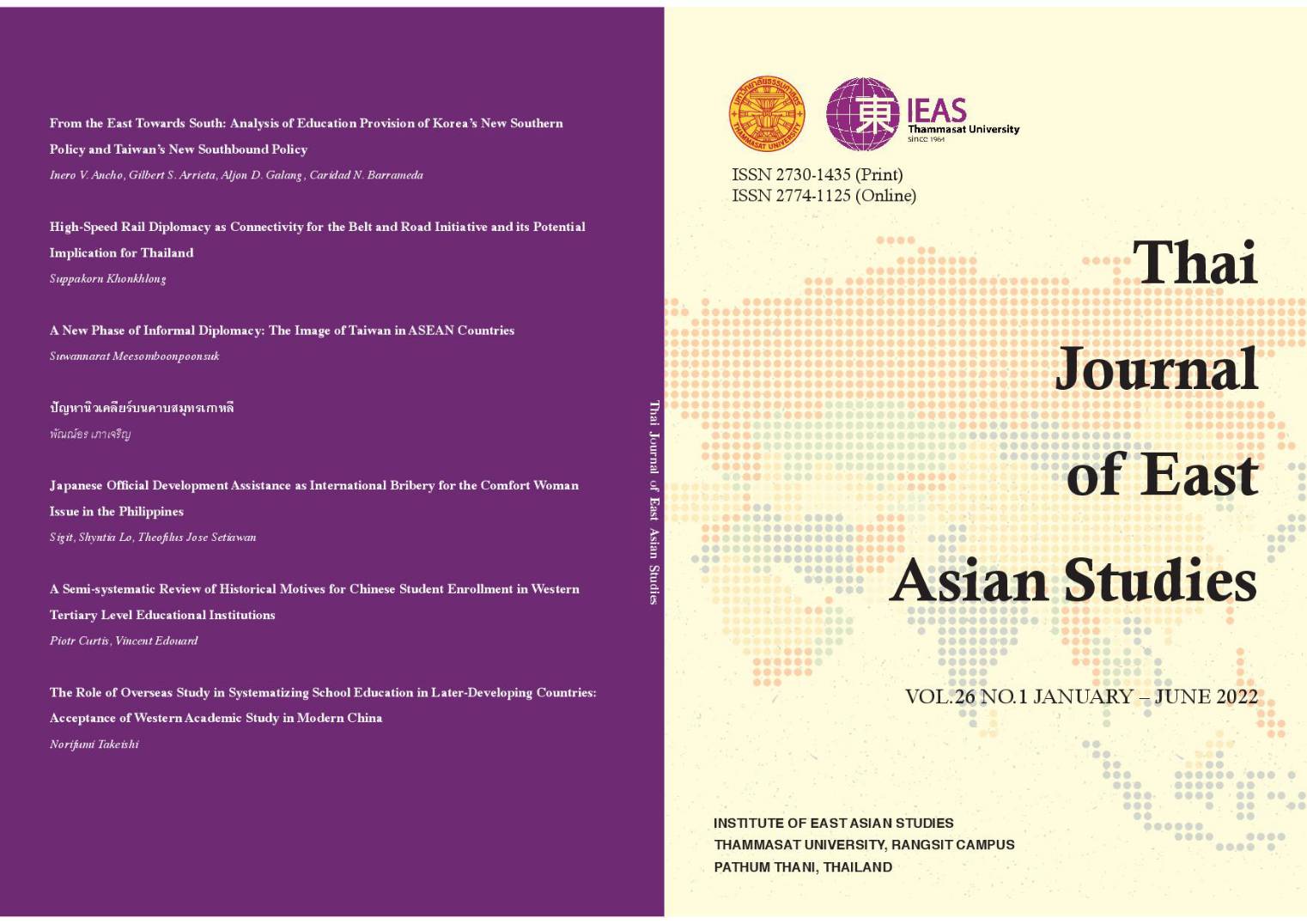From the East Towards South: Analysis of Education Provision of Korea’s New Southern Policy and Taiwan’s New Southbound Policy
Keywords:
Education, Policy, Regional development, Cooperation, ASEAN regionAbstract
New Southern Policy – South Korea (NSP – SK) through the leadership of Jae-in Moon hopes to contribute to harmonizing the relationship between Korea and the ASEAN community with a core focus on people, prosperity, and peace. Both South Korea and Taiwan have advanced different approaches towards the Southeast Asian region.
The New Southbound Policy – Taiwan (NSP – T) under the leadership of Tsi Ing-wen aims to strengthen the relationship and cooperation between Taiwan and southern countries in the region. To be specific, it involves 18 countries to which the following areas for cooperation and exchange will be advanced: tourism, technology, agriculture, medicine, and education. Using the “document as text” approach, NSP – SK and NSP - T are both examined using education perspectives and discourses. Datasets for the study are readily available online and the English versions of both policies were used. The present study aims to describe the NSP – SK and NSP – T in terms of educational provision as an approach to regional cooperation. Common themes or aspects are identified, as education is considered a crucial element for both policies. In addition, both policies are compared and contrasted in terms of educational provisions. Central to the analysis are different education-related concepts to formally determine educational provisions as the analytic content point, with the following emergent themes: people and culture first; human capacity building through education; acculturation through education and sharing for the common good; and education through international collaboration.
Downloads
References
Altbach, P. G., & Knight, J. (2007). The Internationalization of Higher Education: Motivations and Realities. Journal of Studies in International Education, 11(3-4), 290–305. https://doi.org/10.1177/1028315307303542
Bernauer, T., Mohrenberg, S., & Koubi, V. (2020). Do citizens evaluate international cooperation based on information about procedural and outcome quality?. The review of international organizations, 15(2), 505-529.
Cardno, C. (2018). Policy document analysis: A practical educational leadership tool and a qualitative research method. Educational Administration: Theory & Practice, 24(4), 623-640.
Glaser, B., Kennedy, S., Mitchell, D., & Funaiole, M. (2018). The new southbound policy: Deepening Taiwan’s regional integration. Center for Strategic and International Studies. http://csis-website-prod.s3.amazonaws.com/s3fs-public/publication/180613_Glaser_NewSouthboundPolicy_Web.pdf
Kabeer, N. (2015). Gender, poverty, and inequality: a brief history of feminist contributions in the field of international development. Gender & Development, 23(2), 189-205.
Kanbur, R., & Sumner, A. (2012). Poor countries or poor people? Development assistance and the new geography of global poverty. Journal of International Development, 24(6), 686-695.
Kim, B. (2015). Past, present and future of hallyu (Korean wave). American International Journal of Contemporary Research, 5(5), 155-160.
Kim, D., & Park, K.-J. (2012). A cliometric revolution in the economic history of Korea: a critical review. Australian Economic History Review, 52(1), 85–95.
Kim, P. S. (2012). A historical overview of Korean public administration: discipline, education, association, international cooperation and beyond indigenization. International Review of Administrative Sciences, 78(2), 217–238.
Kokudo, N., & Sugiyama, H. (2020). Call for international cooperation and collaboration to effectively tackle the COVID-19 pandemic. Global Health & Medicine, 2(2), 60-62.
Karppinen, K. & Moe, H. (2012). What we talk about when we talk about document analysis. Trends in communication policy research: New theories, methods and subjects, 177-193.
Lim, E., & Hou, E. (2016, May 27). Taiwan, Philippines extend MOU on education exchanges. FOCUS TAIWAN CNA English News. https://focustaiwan.tw/culture/201705270016
Luo, N. (2017, August 16). Japan, Malaysia, Taiwan, and South Korea Remap Regional Student Flows. World Education News + Reviews. https://wenr.wes.org/2017/08/global-mobility-japan-malaysia-taiwan-and-south-korea-seek-to-shift-studentmobility-by-2025
Organization for Economic and Cooperation Development [OECD]. (2016). Innovating Education and Educating for Innovation: The Power of Digital Technologies and Skills OECD Publishing http://dx.doi.org/10.1787/9789264265097-en
OECD & World Bank. (2007). Cross-border tertiary education: A way towards capacity development. https://documents1.worldbank.org/curated/en/130291468150286706/pdf/413320REVISED00r0Tertiary0Education.pdf
Presidential Committee on New Southern Policy. (2021) Seven initiatives under the vision of 3P. http://www.nsp.go.kr/eng/policy/policy4_1.do?number2
Stoffelen, A. (2019). Disentangling the tourism sector’s fragmentation: a hands-on coding/post-coding guide for interview and policy document analysis in tourism. Current Issues in Tourism, 22(18), 2197-2210.
Watton, M. (2020). What is heritage? by Dr Rodney Harrison. Archives and Records, 41(3), 330-332.
You, J. (2021). Advancing international cooperation as a strategy for managing pandemics. Asia Pacific Journal of Public Administration, 43(3), 169-191.
Downloads
Published
How to Cite
Issue
Section
License
Copyright (c) 2022 Thai Journal of East Asian Studies

This work is licensed under a Creative Commons Attribution-NonCommercial-NoDerivatives 4.0 International License.



